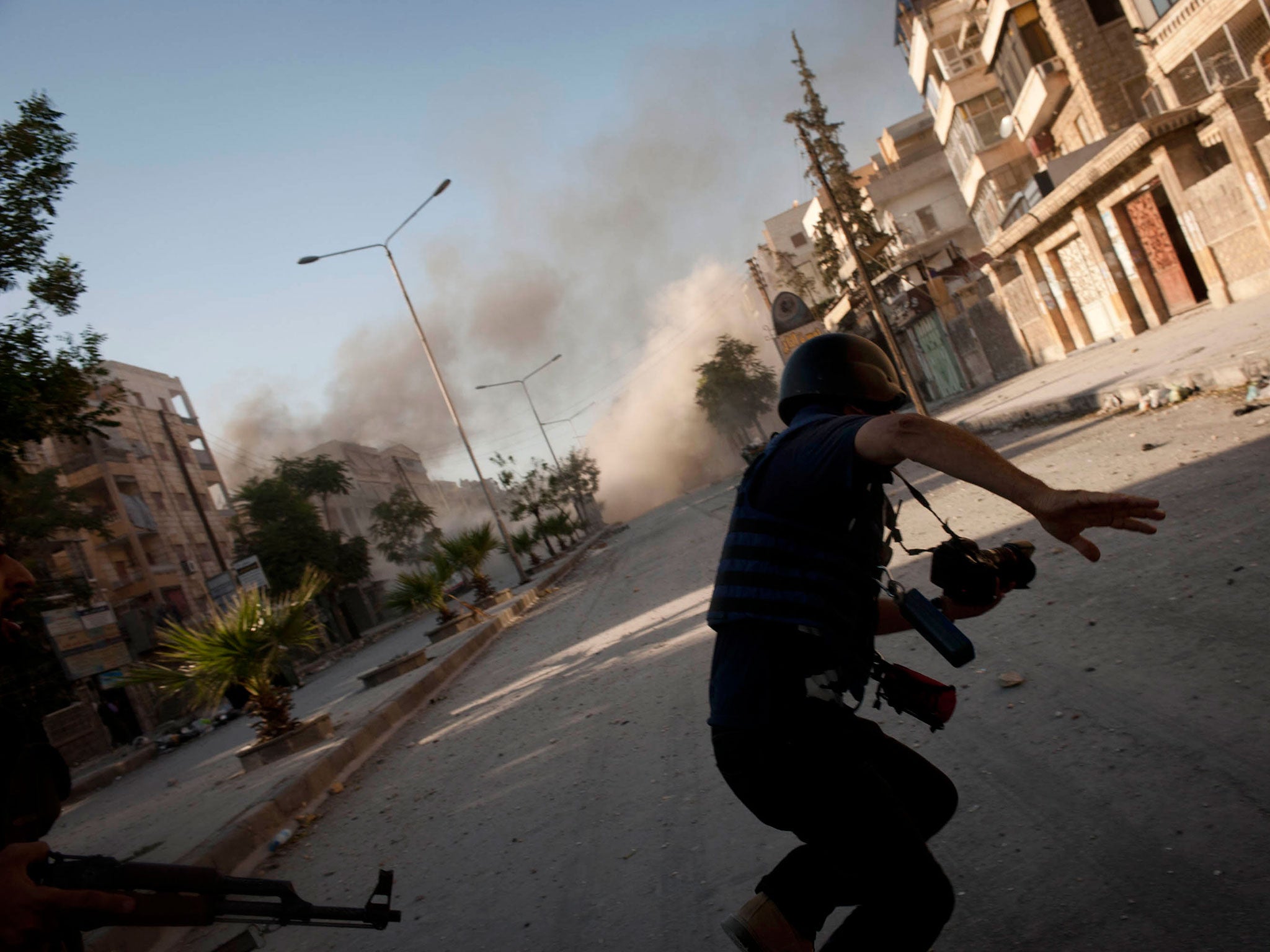Ian Burrell: It has been a year of living dangerously for many in the media and the need for courage has rarely been more clear
The Media Column

While everyone looked to digital technology for the breakthrough that would transform news reporting in 2014, no one imagined that the key tools might be plastic gloves, face masks and a throwaway full-body bio-hazard suit.
The Ebola crisis shows the risks we face in a globalised society and the reporters who braved the West African cities where the virus took hold played an essential role in both highlighting the issue and quantifying the dangers.
Viewers must have been open-mouthed as fearless reporters, notably Alex Crawford of Sky News, suited up in stifling heat and followed body recovery teams through the worst-affected areas. The irrepressible Crawford explained that she wanted to "get under the skin" of "what must be the most dangerous job in the world right now".
I have no doubt that her reportage – and other dispatches from Alex Thomson at Channel 4 News and the BBC’s Tulip Mazumdar – not only helped to alert the public to the suffering in Liberia and Sierra Leone but also reduced hysteria, something the news media is rarely credited for.
Front-line reporting takes many forms and it assumed a new degree of difficulty this year as the menace of Isis (or the self-styled Islamic State) advanced through Syria and Iraq. Journalists, such as Americans James Foley and Steven Sotloff, have been targeted for kidnap and beheading. The terror group has murdered 17 Iraqi media workers and is holding hostage the British photo-journalist John Cantlie, who, depressingly, was recently seen fronting an Isis propaganda video in the besieged Syrian city of Kobani.
For Western news organisations, reporting has become impossible from large tracts of territory, particularly those controlled by Isis. Anthony Loyd of The Times had a narrow escape this year after being kidnapped and shot twice by a Syrian gang. Hardened war correspondents, long used to being allowed to operate in trouble spots by rebel forces that crave publicity, have been forced to watch this conflict from the sidelines. Isis has its own internet-based publicity machine and its ranks include young jihadis with skills in film-making and social media. One recent Isis video was made with the sort of drone camera that The Daily Telegraph’s chief content officer, Jason Seiken, has identified as an instrument of future journalism.
The void created by the difficulties of traditional news providers has created opportunities for others. In something of a coming-of-age for citizen journalism, the investigative website Bellingcat has used open-source techniques to sieve thousands of videos and break stories without the need to be in the actual trenches. Its founder, Eliot Higgins, located the site of Foley’s execution and exposed chemical weapons usage by Bashar al-Assad’s Syrian regime.
Medyan Dairieh of Vice News scooped the world by spending three weeks embedded in the Isis stronghold of Raqqa. The terror group apparently made an exception to its usual bloodthirsty treatment of journalists because it hoped that Vice’s youthful brand would prove a useful recruitment vehicle.
Vice, which has just opened its first TV channel, is moving into a fiercely competitive international news market, into which China, Russia and Qatar are pouring funds. London is seen as an increasingly important global news hub, with RT (formerly Russia Today) opening a UK operation to counter criticism of Vladimir Putin’s regime with relentlessly negative coverage of life in Britain and America. The rather good Qatari-backed Al Jazeera network has opened stunning studios in The Shard in London, close to the new headquarters of News UK.
The rebranded Rupert Murdoch stable has been desperate to distance itself from proceedings at the Old Bailey, where the phone-hacking trial concluded in July with the conviction of Andy Coulson but the acquittal of Rebekah Brooks.
Indeed, the newspaper industry as a whole was eager to move on from hacking, which has done indeterminate damage to its reputation. The Independent Press Standards Organisation replaced the Press Complaints Commission in September – although its chair, Sir Alan Moses, has already had to battle for adequate resources.
Several papers have yet to sign up to the new watchdog, including The Independent, the i and The Guardian, which is set to lose its talismanic editor-in-chief, Alan Rusbridger, who departs in the summer.
Another significant departure is that of Ed Richards, who stands down from Ofcom this month after more than eight years as chief executive and will be replaced by Treasury civil servant Sharon White. Ms White and the newly appointed chair of the BBC Trust, Rona Fairhead, face challenging times as the BBC’s future role in the media ecology is thrashed out ahead of its next funding settlement.
That debate will be all the more complex in the heady environment of a general election campaign when, despite pleas to the contrary, the BBC will inevitably be a subject of contention.
The broadcaster faced protests over its coverage of the Gaza conflict and the Scottish referendum this year and needs a good election. Last week, it warned that its journalists would not be intimidated by party spin-doctors.
The BBC has recently shown a greater willingness to stand up for itself and, after a year in which the importance of brave journalism has never been more obvious, I expect director-general Lord Hall to be more active in keeping political tanks off the BBC’s lawn.
Subscribe to Independent Premium to bookmark this article
Want to bookmark your favourite articles and stories to read or reference later? Start your Independent Premium subscription today.

Join our commenting forum
Join thought-provoking conversations, follow other Independent readers and see their replies